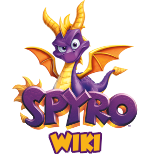Welcome to the Spyro Wiki's new home world!
Feel free to rewrite and expand the articles and upload images that are missing.
Darius: Difference between revisions
From the Spyro Wiki, the Spyro and Skylanders encyclopedia
>Slylanders No edit summary |
>KingCannon No edit summary |
||
| Line 21: | Line 21: | ||
*In the demo, Darius is just text and his dialogue is different: ''"Big enemies cannot be charged, but there are other ways to defeat them. Use your wits and don't forget your flame."'' | *In the demo, Darius is just text and his dialogue is different: ''"Big enemies cannot be charged, but there are other ways to defeat them. Use your wits and don't forget your flame."'' | ||
*In ''Reignited Trilogy'', his G's are silent. | *In ''Reignited Trilogy'', his G's are silent. | ||
*His inspiration of being a poet must have come from | *His inspiration of being a poet must have come from William Shakespeare's [https://en.wikipedia.org/wiki/Hamlet Hamlet] play, in particular, the famous scene where the titular character is seen holding the skull of [https://en.wikipedia.org/wiki/Yorick Yorick] in one hand, reciting "To be, or not to be!". | ||
{{Stub}} | {{Stub}} | ||
Revision as of 17:12, November 20, 2018
Template:Characterbox Template:Q
Darius (ダリアス=グリフーチョ Dariasu in Japanese) is an Artisans dragon who resides in Dark Hollow. He instructs Spyro on how to take down large enemies; not by charging, but by flaming. He is notable for being one of few to pronounce the "G" in "Gnorc".
In Spyro Reignited Trilogy, he seems to be a poet or theater actor, holding a rose, pen and writing board in one hand and a dragon-skull in the other hand. He also wears a blue scarf. He appears to be blue rather than grey.
Also in Spyro Reignited Trilogy (in the credits), he has an art piece with Spyro.
Trivia
- In the demo, Darius is just text and his dialogue is different: "Big enemies cannot be charged, but there are other ways to defeat them. Use your wits and don't forget your flame."
- In Reignited Trilogy, his G's are silent.
- His inspiration of being a poet must have come from William Shakespeare's Hamlet play, in particular, the famous scene where the titular character is seen holding the skull of Yorick in one hand, reciting "To be, or not to be!".
This article is incomplete, otherwise known as a "stub." You can help the Spyro Wiki by adding more.
